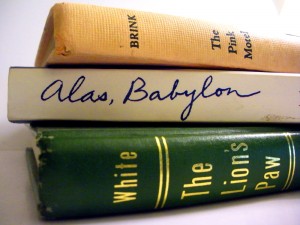On the beach, by the lake, or in your home, few things are more enjoyable on warm summer days than the comfort of a great read. From romance novels to classic tomes, our favorite books seem to awaken every summer and call to us from tote bags, dusty shelves and (as of late) the memory chips of our mobile devices.
But more than just an escape from the drone of daily life, a great book can also help you focus on your own writing project. We can take inspiration from other authors, their characters and their plot lines to refine our stories and get the fuel to power through our writing goals. How? Well, it’s all the skill of the choice. Here are a few guidelines for picking a great summer read that will lead to summer writing:
- Read something with a similar voice and subject matter to your writing project. Reading John Steinbeck to get inspiration for a chick-lit novel is not recommended. You want a book that preferably speaks from the same POV (first person or third person) as your novel in same general style (commercial or literary fiction).
- For that matter, don’t read Steinbeck or any other best-selling author. Comparing yourself to them will only lead you to a state of utter frustration and despair. Pick debut novels by lesser known authors who don’t have decades of experience and an army of editors behind them.
- Take notes on the following as you read:
- Descriptions – Is the book filled with pages and pages of vivid descriptions, or quick explanations with few details? Can you easily translate the author’s descriptions into mental images?
- Character Development – What information does the author provide that makes you identify or sympathize with the lead characters? Do the characters have a balance of positive attributes and faults? What makes them three-dimensional?
- Plot – Is there action on every page or a slower, more gradual build up to to the plot’s turning point and descent into wrap-up? Did you feel like things were evenly paced or did it seem that everything happened at once?
- Put space between your reading and writing: Don’t sit down to work on your novel moments after finishing someone else’s. Give yourself a little bit of time and clear headspace to digest what you’ve read before you begin producing thoughts of your own.
- Perform a follow-up: After you finish reading, visit the author’s website for a follow-up. What types of social media and marketing tools are they using to promote their book? Do they have a section for reviews? If you really enjoyed the book, let the author now! Post a review or contact them via email to offer your congrats and maybe you’ll find a new colleague who can help give you advice on finding writing success.
Using the above tips will help you turn your summer reading experience into a productive exercise for your writing project as well!
We wish you luck and as always, if you have some other suggestions, questions or general comments feel free to shout out in the comments below.
Later days,
Shannon


 We're
We're 









Pingback: Self-Publishing: Carnival of the Indies Issue #10 — The Book Designer()